- Home
- Elizabeth Bear
Hammered
Hammered Read online
The Problems Always Start Small…
Mitch spreads his hands wide, helplessly, and the look that breaks through his veneer chills me. You get to know that expression, after a while. You see it on the ones who’ve adopted goals other than survival. Dead men walking.
“Look, Maker. I’ve got a dead detective. I’ve got Razorface maybe linked to a murder. And not one of his little cleanup killings. I don’t give a damn about those. A dead cop. A dead cop is not good for you and it is not good for me and it is not good for your gangster boyfriend. And a street full of dead kids poisoned by Canadian special forces combat drugs—that’s not good for you either. Since I know how much you like people poking into your history. No?”
Mitch’s eyes flicker around my shop in that way he has, recording everything.
Our eyes meet: I see him in living color on the right side, and in high-resolution black and white complete with thermal readings and a heads-up array on the left. The bulge of his gun glimmers red on the threat display. Distracting. “It isn’t about that, Mitch.”
“Good. Then are you going to help me, or not?”
ADVANCE PRAISE FOR
HAMMERED
“A gritty and painstakingly well-informed peek inside a future we’d all better hope we don’t get, liberally seasoned with VR delights and enigmatically weird alien artifacts. Genevieve Casey is a pleasingly original female lead, fully equipped with the emotional life so often lacking in military SF yet tough and full of noir attitude; old enough by a couple of decades to know better but conflicted enough to engage with the sleazy dynamics of her situation regardless. Out of this basic contrast, Elizabeth Bear builds her future nightmare tale with style and conviction and a constant return to the twists of the human heart.”
—Richard Morgan
“Hammered has it all. Drug wars, hired guns, corporate skulduggery, and bleeding-edge AI, all rolled into one of the best first novels I’ve read in I don’t know how long. This is the real dope!”
—Chris Moriarty, author of Spin State
“A glorious hybrid: hard science, dystopian geopolitics, and wide-eyed sense of wonder seamlessly blended into a single book. I hate this woman. She makes the rest of us look like amateurs.”
—Peter Watts, author of Starfish and Maelstrom
“Packed with a colorful panoply of characters, a memorable and likeable antiheroine, and plenty of action and intrigue, Hammered is a superbly written novel that combines high tech, military-industrial politics, and complex morality. There is much to look forward to in new writer Elizabeth Bear.”
—Karin Lowachee, Campbell Award–nominated author of Warchild
“Even in scenes where there is no violent action, or even much physical action at all, the thoughts and emotions of Ms. Bear’s characters, as well as the dynamic tensions of their relationships, create an impression of feverish activity going on below the surface and liable to erupt into plain view at any moment…. The language is terse and vivid, punctuated by ironic asides whose casual brutality—sometimes amusing, sometimes shocking—speaks volumes about these people and their world…. This is a superior piece of work by a writer of enviable talents. I look forward to reading more!”
—Paul Witcover, author of Waking Beauty
“Hammered is one helluva good novel! Elizabeth Bear writes tight and tough and tender about grittily real people caught up in a highly inventive story of a wild and woolly tomorrow that grabs the reader from the get-go and will not let go. Excitement, intrigue, intelligence—and a sense of wonder, too! Who could ask for anything more?”
—James Stevens-Arce, author of Soulsaver, Best First Novel 2000 (Rocky Mountain News)
“In this promising debut novel, Elizabeth Bear deftly weaves thought-provoking ideas into an entertaining and tight narrative.”
—Dena Landon, author of Shapeshifter’s Quest (Dutton, fall 2004)
This book is dedicated to
Dr. Richard P. Feynman and
Dr. Robert L. Forward
—for being unable to put down a puzzle.
Acknowledgments
It takes a lot of people to write a novel. This one would not have existed without the assistance of my very good friends and first readers (on and off the Online Writing Workshop for Science Fiction, Fantasy, and Horror)—especially but not exclusively Kathryn Allen, Rhonda Garcia, Jaime Voss, Chris Coen, Ilona Gordon, Jean Seok, Derek R. Molata, Tara Devine, Chelsea Polk, Caliann Graves, James Stevens-Arce, Michael Curry, and Larry West. I am even more deeply indebted to Stella Evans, M.D., to whom I owe whatever bits of the medical science and neurology are accurate; to M.Cpl. S. K. S. Perry (Canadian Forces) and Capt. Beth Coughlin (U.S. Army), without whom my portrayal of military life would have been even more wildly fantastical; to Leah Bobet, my native guide to Toronto; to Thomas Ladegard, whose firsthand experience in the sewers of Hartford proved invaluable; to Stephen Shipman for handgun tips; to Asha C. Shipman for listening to me curse (and type) late into the night; to my copyeditor, Faren Bachelis; to the North Las Vegas Police Department’s Lt. Ed Finizie and Officer Marion Brady for giving me some idea what it means to be a big-city cop; to Dena Landon, Sarah Monette, and Kelly Morisseau, francophones extraordinaire, upon whom may be blamed any correctness in the Québecois—especially the naughty bits; to Jennifer Jackson and Anne Groell for too many reasons to enumerate; and most especially to my husband, Chris, for staying married to me not only through the third novel (blamed for many a divorce), but through the fourth, fifth, and sixth ones, too.
The failures, of course, are my own, with one exception: Jenny’s completely wrong about the squirrels.
Editor’s Note
In the interests of presenting a detailed personal perspective on a crucial moment in history, we have taken the liberty of rendering Master Warrant Officer Casey’s interviews—as preserved in the Yale University New Haven archives—in narrative format. Changes have been made in the interests of clarity, but the words, however edited, are her own.
The motives of the other individuals involved are not as well documented, although we have had the benefit of our unique access to extensive personal records left by Col. Frederick Valens. The events as presented herein are accurate: the drives behind them must always remain a matter of speculation, except in the case of Dr. Dunsany—who left us comprehensive journals—and “Dr.” Feynman, who kept frequent and impeccable backups.
What follows is a historical novel, of sorts. It is our hope that this more intimate annal than is usually seen will serve to provide future students with a singular perspective on the roots of the civilization we are about to become.
—Patricia Valens, Ph.D.
Jeremy Kirkpatrick, Ph.D.
0307 hours, Wednesday 29 August, 2062
Hartford, Connecticut
Sigourney Street
Abandoned North End
I never sleep if I can help it.
So when somebody starts trying to kick down my door at 0300 hours on a rank hot summer night, it isn’t quite the surprise for me that it might be for some people. When the noise starts, I’m sitting on a gouged orange plastic chair in my shop. I drop my old-fashioned paperback book, stand, and draw my sidearm before sidling across oil-stained concrete to flick the monitor on. Smart relays in the gun click on in recognition of my palm print, too quietly for normal ears to hear. The air thickens in my lungs; my heartbeat slows ominously.
And then I curse out loud and go open up the big blue steel door, holding the safetied pistol casually in my meat hand while the metal one turns the knob.
“You wanna pound the damn door down?” I accuse, and then I get a good look at the purple-faced kid dying in Razorface’s arms and I’m all somebody’s sergeant, somebody’s mother. Not that the two are all that differe
nt.
“Ah, shit, Face. This kid is hammered. What do you expect me to do with this?”
Face shoves past me, skirting a dangling engine block and a neat pile of sheet metal, two of his “boys”—teenage hoods—trailing like ducklings. He doesn’t answer immediately. Even as I take his name loudly in vain, Razorface carries the baby gangster gently around the scarred steel lab table that holds up my hot plate. He lays the kid on my cot in the corner of the shop, wrinkling the taut brown blanket. Razorface, Razorface. Gets his name from a triple row of stainless steel choppers. Skin black as velvet and shoulders wide as a football star’s. The old kind of football, yeah.
I know the kid: maybe fourteen, maybe twelve. His name is Mercedes. He’s rigid, trying to suck air and failing. Anaphylactic shock. Besides that, dark red viscous blood oozes out of his nose, and his skin looks like pounded meat. The nosebleed and the wide-open capillary color of his face are dead giveaways, but I give him the once-over anyway. Then I grab my kit and lug it over, dropping to my knees on the cold damp concrete beside the cot. Bones and metal creak. The room reeks of Razorface’s sweaty leather, the kid’s blood, diesel fuel. Once it would have made me gag. I ain’t what I used to be.
“Can you fix him, Maker?”
Face’s boys stand twitching just inside the doorway.
I fumble in my kit, finding epinephrine, the long needle. Even as I fill a syringe I know the answer. “Nah, Face. There’s no fucking way.” But I have to try. ’Cause Face is one of mine, and the kid is one of his.
I don’t look at the punks. “Will one of you two be so fucking kind as to lock the goddamned door?”
“Derek,” Razorface says, “do it,” and the taller of the two shoots him a sullen-jawed look and stalks away.
I know already, from the color of Merc’s skin, but I need to ask—so I turn my grim expression on Razorface.
“What’d he OD on?” Please God let me be wrong.
They can break you of religion, but they can’t break you of praying.
Face holds out a twist of pills, and a chill snakes up my spine. I reach out with my metal hand and take the packet away from him, squeezing the ends to pop the slit. “Putain de marde!” Yellow pills, small as saccharine tablets, with a fine red line across the diameter. Rigathalonin. Hyperex.
We used to call it the Hammer.
How did a two-bit piece of street trash get his hands on something like this? And just what on God’s gray earth do you think I can do for a kid who chewed down a handful of Hammers, Face? But I don’t say that. I say, “How long ago? When did he take them?”
Face answers. “An hour ago. About an hour ago,” and the taller gangster starts to whine.
I glare up at Whiny. “Shut up. How many of these did he take? Anybody see?” Nothing that I can manage—that anybody can manage—is going to make a difference for this kid. If Merc’s central nervous system isn’t already so much soft-serve, I’m not a card-carrying member of the Teamster’s Union.
“One,” Whiny says. I curse him for a liar, but the other one—Dopey? Doc?—backs him up. Allergic reaction? Merci à Dieu. I drive the needle into his flesh, through cartilage, into the spasming muscle of the heart.
He quits twitching and his eyes fly open, but there’s nobody home. I’ve seen it before. The funny purple color will drain out of his face in a couple of hours, and he’ll be just like any other vegetable. I should have let him kick it when I could. Kinder than letting him live.
You’re a hard woman, Jenny Casey. Yeah, well, I come by it honestly. “Shit,” I whisper. “Another kid. Shit.”
I wipe cold sweat from my face, flesh hand trembling with the aftershock. I’ll be sick for hours. The only thing worse than the aftermath of a plunge into combat-time is stepping up to the edge and then backing off.
All right. Time to make coffee. And throw Razorface’s gangsters out onto the street so I can pat him on the shoulder, with nobody else to see.
Later, I wash my face in the stained steel sink and dry it on a clean rag. I catch myself staring into my own eyes, reflected in the unbreakable mirror hanging on my wall. I look chewed. Hell, you can barely tell I’m a girl. Not exactly girlish anymore, Jenny.
Hah. I won’t be fifty for a month.
You wouldn’t think I’d spend a lot of time staring in mirrors, but I never got used to that face. I used to stand there and study it every morning when I brushed my teeth, trying to figure out what the rest of the world saw. Vain as a cat of my glamorous good looks, don’t you know?
Stained torn sleeveless shirt and cami pants over a frame like rawhide boiled and wired to bone. An eagle’s nose—how come you never broke that witch’s nose, Jenny?—the skin tone and the cheekbones proclaim my three mostly Mohawk grandparents. Shiny pink burn scars. A prosthetic eye on the left half of the face.
Oh, yeah. And the arm. The left arm. From just below the shoulder it’s dull, scratched steel—a clicking horror of a twenty-year-old Canadian Army prosthesis.
“Marde.” I glance over at Face, who hands me another cup of coffee. After turning back to the steel table, I pour bourbon into it. Shaking my head, I set mug and bottle aside. My arm clicking, I hoist my butt onto the counter edge.
“Where’d he get it?” I hook the orange chair closer with my right foot and plant it on the seat, my bad leg propped on the back. Hell of a stinking summer night, and it’s raining again. The tin roof leaks in three places; rain drums melodiously into the buckets I’ve set underneath. I run wet fingers through white-stippled hair. It won’t lie flat. Too much sweat and grime, and I need a shower, so it’s a good thing the rain’s filling the rooftop tanks.
The left side of my body aches like the aftermath of a nasty electrical jolt.
Face rolls big shoulders, lifting his coffee cup to his mouth. The ceramic clinks against his prosthetic teeth, and then he eases his body down into another old chair. It creaks under his weight as he swings his feet up onto the counter beside me, leaning back. Regarding me impassively, he shrugs again—a giant, shaven-headed figure with an ear and a nose full of gold and a mouth full of knife-edged, gleaming steel. The palms of his hands are pink and soft where he rolls them over the warmth of the mug; the rest of him shines dark and hard as some exotic wood. A little more than two-thirds my age, maybe. Getting old for a gangster, Face.
“Shit, Maker. I got to do me some asking about that.”
I nod, pursing my lips. The scars on my cheek pull the expression out of shape. Face’s gaze is level as I finish the spiked coffee in a long, searing swallow. The thermostat reads 27°C. I shiver. It’s too damn cold in here. “Hand me that sweater.”
He rises and does it wordlessly, and then refills my cup without my asking. “You drink less coffee, maybe eat something once in a while, you wouldn’t be so damn cold all the time.”
It’s not being skinny makes me shiver, Face. It’s a real old problem, but they give it a longer name every war.
“All right,” I mumble. “So what do you want to do about it?” He knows I don’t mean the cold.
Face turns his attention to the corpse-silent child on my narrow bed. “You think the shit was bad?”
I bite my lip. “I hope he was allergic. Otherwise—” I can’t finish. I wonder how many of those little plastic twists are out in the neighborhoods. I rake my hand through stiff hair and shake my head. Hyperex is not a street drug. It is produced by two licensed pharmaceutical companies under contract for the U.S. armed forces and—chiefly—for the C.A. It’s classified. And complicated.
The chances of a street-level knockoff are slim, and I don’t think a multinational would touch it.
“What the hell else could it be?” I wave my left hand at the twist on the table. The light glitters on the scratches and dents marking my prosthesis. He doesn’t answer.
After setting my cup aside, I raise my arm to pull the sweater up to my shoulder. It snags on the hydraulics of the arm and I have to wiggle the thread loose. Cette putain de machine. Face doesn
’t stare at the puckered line of scar a few centimeters below the proximal end of my humerus. Did I mention that I like that man? I pause to comment, “Half a dozen tabs in there. You want to try one out, eh?”
Then I drag the black sweater over my head, twisting the sleeves around so the canvas elbow patches are where they should be, mothball-scented cotton-wool warm on my right arm only. The left one aches—phantom pain. My body trying to tell me something’s wrong with a hand I lost a quarter century back.
Long slow shake of that massive head, bulldog muscle rippling along the column of his neck. “I don’t want this shit on my street, Maker.” A deep frown. I hand him the bottle of bourbon by my elbow, and he adds a healthy dose to his cup along with a double spoonful of creamer and enough sugar to make me queasy. What is it about big macho men that they have to ruin perfectly good coffee?
I’m shaking less. I nearly triggered earlier, and the reaction won’t wear off for a while yet, but the booze and the caffeine double-teaming my system help to smooth things. I raise my own cup to my lips, inhale alcohol fumes and the good rich smell of the roasted beans. Fortified, I brace myself and go down deep, after the memories I usually leave to rot. Old blood, that. Old, bad blood.
Two more breaths and I’m as ready to talk about it as I’ll ever be. “I’ve never seen anybody do that off a single hit, Face. We’d get guys once in a while, who’d been strung out and on the front line for weeks, who’d push it too far and do the froth-and-foam. But not off a tablet. The Hammer’s not like that.” I glance over at Mercedes, who is resting quietly on my cot. “Poor stupid kid.”
“He’s cooked, ain’t he?”
I nod slowly, tasting bile, and reach for the bourbon. Razorface hands it to me without even looking and I kick the chair away and hop down, holster creaking, wincing as weight hits my left knee and hip. There’s a lot of ceramic in there.

 Scardown
Scardown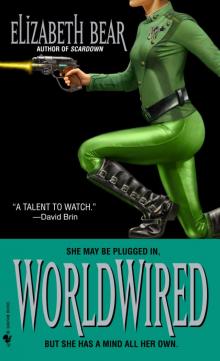 Worldwired
Worldwired Ancestral Night
Ancestral Night Hammered
Hammered The Red Mother
The Red Mother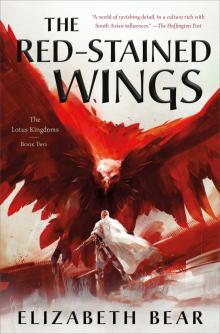 The Red-Stained Wings--The Lotus Kingdoms, Book Two
The Red-Stained Wings--The Lotus Kingdoms, Book Two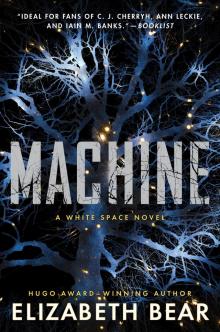 Machine
Machine Some of the Best from Tor.com: 2019 Edition
Some of the Best from Tor.com: 2019 Edition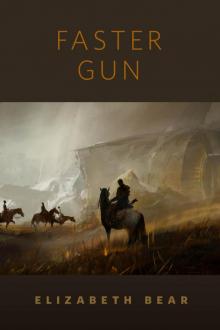 Faster Gun
Faster Gun In the House of Aryaman, a Lonely Signal Burns
In the House of Aryaman, a Lonely Signal Burns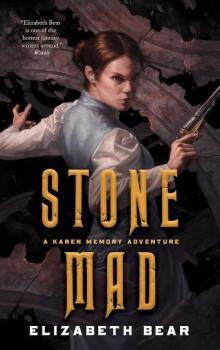 Stone Mad
Stone Mad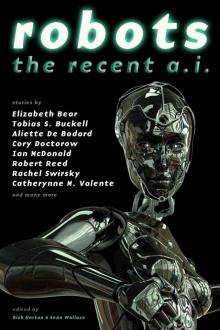 Robots: The Recent A.I.
Robots: The Recent A.I. The Tempering of Men
The Tempering of Men Boojum
Boojum Book of Iron bajc-2
Book of Iron bajc-2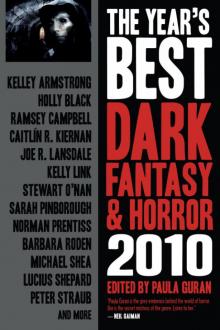 The Year's Best Dark Fantasy and Horror, 2010
The Year's Best Dark Fantasy and Horror, 2010 New Cthulhu 2: More Recent Weird
New Cthulhu 2: More Recent Weird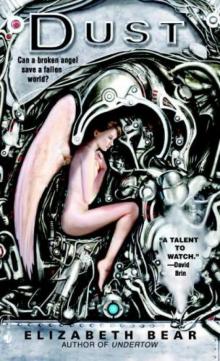 Dust jl-1
Dust jl-1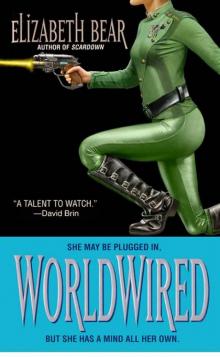 Worldwired jc-3
Worldwired jc-3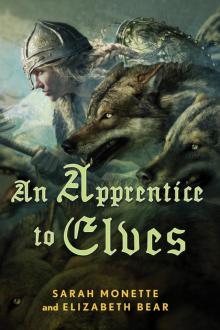 An Apprentice to Elves
An Apprentice to Elves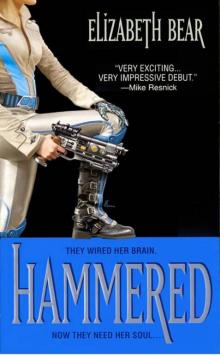 Hammered jc-1
Hammered jc-1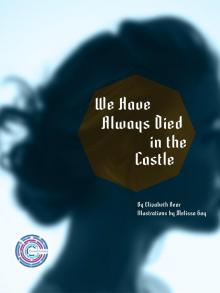 Crowd Futures: We Have Always Died in the Castle
Crowd Futures: We Have Always Died in the Castle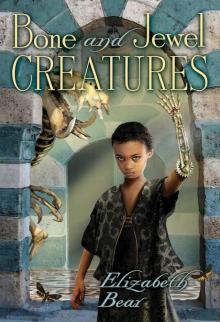 Bone and Jewel Creatures bajc-1
Bone and Jewel Creatures bajc-1 Carnival
Carnival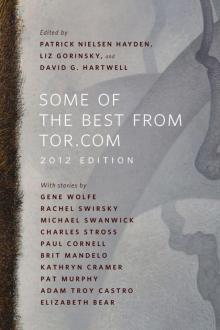 Some of the Best from Tor.com: 2012 Edition: A Tor.Com Original
Some of the Best from Tor.com: 2012 Edition: A Tor.Com Original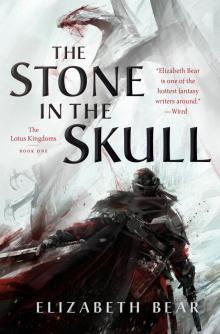 The Stone in the Skull
The Stone in the Skull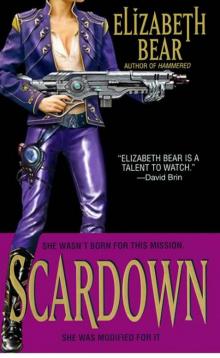 Scardown jc-2
Scardown jc-2 Hell and Earth pa-4
Hell and Earth pa-4 Undertow
Undertow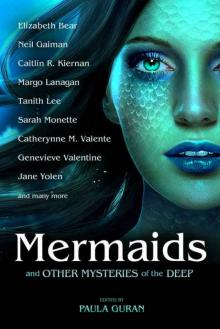 Mermaids and Other Mysteries of the Deep
Mermaids and Other Mysteries of the Deep A Companion to Wolves
A Companion to Wolves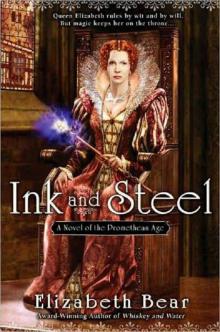 Ink and Steel pa-3
Ink and Steel pa-3